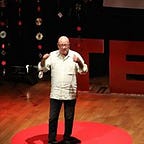Being An Asshole Or Not Being an Asshole: That’s a Question Now Being Considered at the Cannes Lion Creativity Festival
During the Summer of 2016 a Public Service Video, “The World’s Biggest Asshole,” appeared on YouTube from Donate Life America, an organ-donation non-profit. It featured the seeming embodiment of an asshole, Coleman Sweeney, who people rightly thought of as an indecent and hostile jerk…until the end of his life when it was discovered he had registered to be an organ donor. The video went viral. Why? And why is this one of the films predicted to sweep the awards at the Cannes Lion Creativity Festival?
The ad was made by The Martin Agency with two directors, Speck and Gordon, from a collaboration between Furlined and Love Child. Much has been cogently written about the Coleman Sweeney ad, for example, by Jennifer Rooney and Will Burns, both writing for Forbes’ CMO Network. To complement these writings I offer a moment’s narrative written from my point of view, a person who consults with ad agencies but who is not of the world of advertising. I am a cognitive neuroscientist and cultural anthropologist who has worked in the primeval forest, in the strategy rooms on Pennsylvania Avenue and in the war rooms on Madison Avenue.
Real People Are Not Consistent
For the most part, business likes to make life into something that is predictable and, therefore, manageable: Risk-free. It cuts life into short snippets that eliminate flux. It makes everything into numbers that deneuter human aliveness. Business also says all brand expressions — particularly the personality of the brand — must be consistent. Yet people — people in real life — are NOT consistent.
I’ve heard top trial attorneys say that the surest giveaway to the deception of a witness is his story being too consistent and straight-forward. Real life is not linear, logical or objective. Emotion, metaphor and paradox are the base coin of human existence. Real stories have a zig and a zag, and that’s what makes them real and memorable. The interesting thing with this “Asshole” PSA that turns the story from one of bad guy to one of good guy might be such a shift is relatively scarce to the ad industry. However, the popularity of the ad may very well reside in people (AKA: Consumers) seeing something of real life in an ad. Now, that would be a surprise. Mr. Sweeney isn’t an asshole. He’s an asshole AND he’s not an asshole. People are like that, too. Let’s recall Walt Whitman: “I contain multitudes.”
Ad creators would do well to feel and portray their true voice and not try to calculate and control it in the name of industry dogmas, such as consistency. The imperfections of human detail generate what people really appreciate. Human contradiction is what makes people — audiences — truly connect.
Money and Death Are Unlike All Other Domains
Another operative factor in audience reaction to “The World’s Biggest Asshole” is the topic of death. In my consulting work I have found that health and finance are unique arenas compared to how people relate to them compared to all other industry domains. In healthcare (let’s call it the “avoidance of death”) and in finance (let’s call it “will I have enough” and “what is enough”), people first seek to minimize loss before they maximize gain. Sweeney could have been thinking: Maybe if I’m a good guy, things will turn out okay in the end, even it’s after the end. The “selfish gene” meets “reciprocal altruism.”
What “Clutter”?
We hear constant industry talk about “cutting through the clutter.” Well, neurologically speaking, the occurrence of too much stimuli affecting consciousness and decision-making is relatively rare, save battlefield commanders. What a person deems relevant, unexpected or tantalizing usually gets attended to. What is business-as-usual, mediocrity, is left on the mind’s cutting room floor. Wow-jobs and Sell-jobs fade from mind quickly. What becomes memory and story is real-life rendered artfully, contradictions included.
Risking and Agonizing
People such as David Fleming, CEO, Donate Life America, Joe Alexander of The Martin Agency, and Speck and Gordon of Furlined and Love Child, are working atop the buoyancy created by the likes of Bill Burnbach’s “Small Is Beautiful” and “You don’t have to be Jewish to Love Levy’s Jewish Rye”, as well as Charles Eames’ notion of “Delicious Agony,” whereby you take a risk by open-endedly entering the journey from not knowing to knowing. Peoples’ reaction to “The World’s Biggest Asshole” has shown us that the only risk is not taking a risk.
Being a collaborator with chance makes the bouquet of life, sweet. We all would be better off if we donate our real being to what we do.
